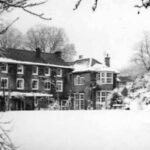Biography:
Richard Powell Cooper
21/09/1847 –30/07/1913
Richard Powell Cooper
 View full burial details
View full burial details
SIR RICHARD POWELL COOPER: 1847 – 1913
Richard was born on the 21st September 1847 in Clunbury, Shropshire. He was the second of three sons[1] born to Henry Cooper (brother of William Cooper). Henry was a farmer and farrier. Richard was privately educated and later attended the Royal College of Veterinary Surgeons and he gained his MRCVS degree in 1868. Richard qualified as a vet as the result of an agreement made between his father Henry and his uncle William. William Cooper was a veterinary product manufacturer living in Berkhamsted. He had no children and it was agreed that Richard and his older brother William Farmer Cooper would, when qualified, join William in his business.
Whilst Richard’s older brother, William Farmer, joined his uncle’s business, Richard, on qualifying did not, instead setting up his own veterinary practice in Lichfield, Staffs.
In 1872 Richard married Elizabeth Alica Ashmall. They had two sons, Richard Ashmole Cooper and William Francis Cooper, and three daughters, Lucy Ann Cooper, Mary Mabel “Dolly” Cooper and Edith Maud Cooper. In 1881 the family was living at 52 Bore Street, Lichfield. In 1889 they moved to Shenstone Court, a large house with a park of 103 acres.
Richard’s younger brother, Herbert Henry, joined his uncle and brother, William Farmer in the Berkhamsted business. In 1882 William Farmer died and Richard began his association with the company. He retained his veterinary practice in Lichfield, but travelled to Berkhamsted one day a week to help his brother and uncle. When his uncle died in 1885, Richard increased the time he spent in Berkhamsted to three days a week. His younger brother, Herbert, died in 1891, and Richard became sole owner of the Berkhamsted business. When Richard’s son, Richard Ashmole, came of age in 1895, he too joined the company and was made a partner.
Richard was considered by his contemporaries a shrewd businessman. As well as running the family business, he controlled arsenic mines in Cornwall (arsenic was one of the ingredients in the company’s sheep dip), he owned Anglo-Peninsula Chemical Company in Portugal and with a partner purchased London’s Olympia.
Richard was a keen stock breeder with farms at Shenstone, Berkhamsted and Napwell, near Cambridge. By 1901 he owned a quarter of a million acres, including a sheep station in Australia, three farms in Africa and two ranches in South America. It was said of him when he died that he was the biggest farmer in the world.
In 1905, Richard was made a baronet for his services to agriculture. He became 1st Baronet Cooper of Shenstone Court, Shenstone, Staffs. He was a councillor and later an Alderman in Lichfield, a Governor of the Grammar School, member of Staffordshire County Council, a J.P. and in 1901 High Sherrif of Staffordshire. He was also Veterinary Lieutenant to the Staffordshire Imperial Yeomanry.
He also enjoyed country sports. He was a keen horseman and won the South Staffordshire point to point two year in succession. He had an interest in the South Staffordshire Hounds and owned large areas of shooting lands.
In the late 1880’s Richard and his brother Herbert became involved in the development of Frinton on Sea.
Richard died on 30th July 1913 at Whitehill, his daughter’s house in Berkhamsted. His funeral took place a few days later, on Saturday 2nd August. Although Richard was not a resident of the town, he was nevertheless held in great esteem and the town turned out to mourn him. His funeral cortege made its way to St Peter’s Church where it was met by the staff of William Cooper & Nephews, each wearing a visible sign of mourning. Four clergymen conducted his funeral service and he was then laid to rest in the Cooper family vault in Rectory Lane Cemetery.[2]
 View this burial
View this burial in the cemetery
SIR RICHARD POWELL COOPER: 1847 – 1913
Richard was born on the 21st September 1847 in Clunbury, Shropshire. He was the second of three sons[1] born to Henry Cooper (brother of William Cooper). Henry was a farmer and farrier. Richard was privately educated and later attended the Royal College of Veterinary Surgeons and he gained his MRCVS degree in 1868. Richard qualified as a vet as the result of an agreement made between his father Henry and his uncle William. William Cooper was a veterinary product manufacturer living in Berkhamsted. He had no children and it was agreed that Richard and his older brother William Farmer Cooper would, when qualified, join William in his business.
Whilst Richard’s older brother, William Farmer, joined his uncle’s business, Richard, on qualifying did not, instead setting up his own veterinary practice in Lichfield, Staffs.
In 1872 Richard married Elizabeth Alica Ashmall. They had two sons, Richard Ashmole Cooper and William Francis Cooper, and three daughters, Lucy Ann Cooper, Mary Mabel “Dolly” Cooper and Edith Maud Cooper. In 1881 the family was living at 52 Bore Street, Lichfield. In 1889 they moved to Shenstone Court, a large house with a park of 103 acres.
Richard’s younger brother, Herbert Henry, joined his uncle and brother, William Farmer in the Berkhamsted business. In 1882 William Farmer died and Richard began his association with the company. He retained his veterinary practice in Lichfield, but travelled to Berkhamsted one day a week to help his brother and uncle. When his uncle died in 1885, Richard increased the time he spent in Berkhamsted to three days a week. His younger brother, Herbert, died in 1891, and Richard became sole owner of the Berkhamsted business. When Richard’s son, Richard Ashmole, came of age in 1895, he too joined the company and was made a partner.
Richard was considered by his contemporaries a shrewd businessman. As well as running the family business, he controlled arsenic mines in Cornwall (arsenic was one of the ingredients in the company’s sheep dip), he owned Anglo-Peninsula Chemical Company in Portugal and with a partner purchased London’s Olympia.
Richard was a keen stock breeder with farms at Shenstone, Berkhamsted and Napwell, near Cambridge. By 1901 he owned a quarter of a million acres, including a sheep station in Australia, three farms in Africa and two ranches in South America. It was said of him when he died that he was the biggest farmer in the world.
In 1905, Richard was made a baronet for his services to agriculture. He became 1st Baronet Cooper of Shenstone Court, Shenstone, Staffs. He was a councillor and later an Alderman in Lichfield, a Governor of the Grammar School, member of Staffordshire County Council, a J.P. and in 1901 High Sherrif of Staffordshire. He was also Veterinary Lieutenant to the Staffordshire Imperial Yeomanry.
He also enjoyed country sports. He was a keen horseman and won the South Staffordshire point to point two year in succession. He had an interest in the South Staffordshire Hounds and owned large areas of shooting lands.
In the late 1880’s Richard and his brother Herbert became involved in the development of Frinton on Sea.
Richard died on 30th July 1913 at Whitehill, his daughter’s house in Berkhamsted. His funeral took place a few days later, on Saturday 2nd August. Although Richard was not a resident of the town, he was nevertheless held in great esteem and the town turned out to mourn him. His funeral cortege made its way to St Peter’s Church where it was met by the staff of William Cooper & Nephews, each wearing a visible sign of mourning. Four clergymen conducted his funeral service and he was then laid to rest in the Cooper family vault in Rectory Lane Cemetery.[2]
Relatives
Historical Connections
The following local places of interest are linked to Richard Powell Cooper:





 Coopers Chemical Works
Coopers Chemical Works Berkhamsted Castle
Berkhamsted Castle Ashlyns Hall
Ashlyns Hall Sunnyside Church
Sunnyside Church White Hill
White Hill
 Military graves
Military graves